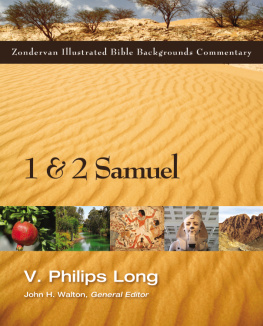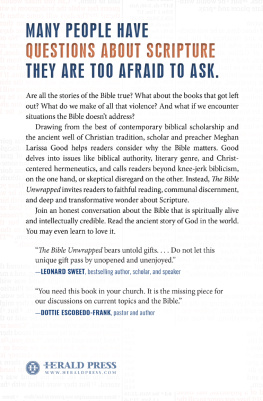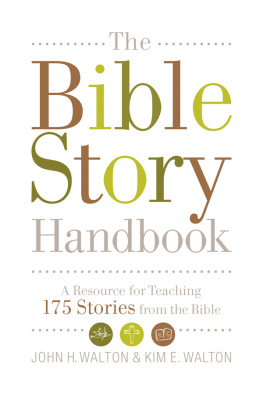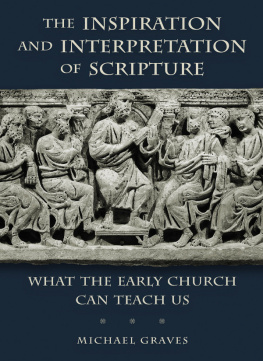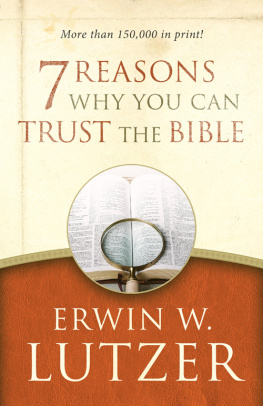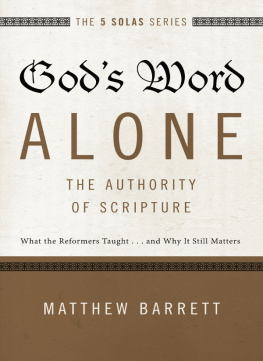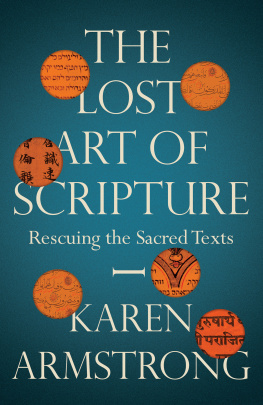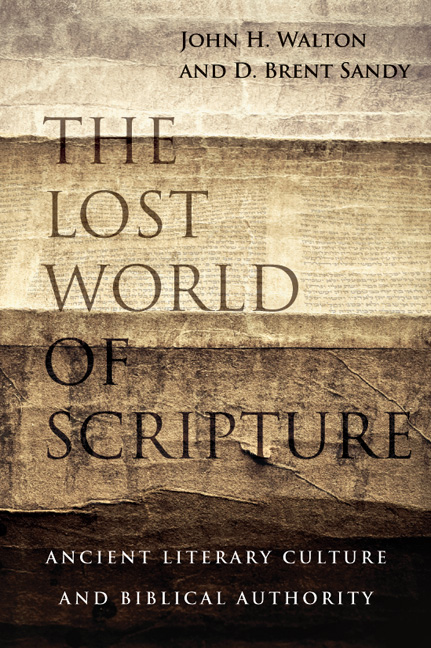InterVarsity Press
P.O. Box 1400,
Downers Grove, IL 60515-1426
World Wide Web: www.ivpress.com
Email:
2013 by John H. Walton and D. Brent Sandy
All rights reserved. No part of this book may be reproduced in any form without written permission from InterVarsity Press.
InterVarsity Press is the book-publishing division of InterVarsity Christian Fellowship/USA, a movement of students and faculty active on campus at hundreds of universities, colleges and schools of nursing in the United States of America, and a member movement of the International Fellowship of Evangelical Students. For information about local and regional activities, write Public Relations Dept., InterVarsity Christian Fellowship/USA, 6400 Schroeder Rd., P.O. Box 7895, Madison, WI 53707-7895, or visit the IVCF website at www.intervarsity.org .
All Scripture quotations, unless otherwise indicated, are taken from THE HOLY BIBLE, NEW INTERNATIONAL VERSION, NIV Copyright 1973, 1978, 1984, 2011 by Biblica, Inc. Used by permission. All rights reserved worldwide.
Cover design: Cindy Kiple
Images:
paper texture: THEPALMER/iStockphoto
scroll: Matthew Ragen/iStockphoto
ISBN 978-0-8308-6498-0 (digital)
ISBN 978-0-8308-4032-8 (print)
Contents
PART 1
The Old Testament World of Composition and Communication
Proposition 1
Ancient Near Eastern Societies Were Hearing Dominant and Had Nothing Comparable to Authors and Books as We Know Them
Proposition 2
Expansions and Revisions Were Possible as Documents Were Copied Generation After Generation and Eventually Compiled into Literary Works
Proposition 3
Effective Communication Must Accommodate to the Culture and Nature of the Audience
Proposition 4
The Bible Contains No New Revelation About the Workings and Understanding of the Material World
Stepping Back and Summing Up
How the Composition of the Old Testament May Be Understood Differently in Light of What Is Known of Ancient Literary Culture
PART 2
The New Testament World of Composition and Communication
Proposition 5
Much of the Literature of the Greco-Roman World Retained Elements of a Hearing-Dominant Culture
Proposition 6
Oral and Written Approaches to Literature Entail Significant Differences
Proposition 7
Greek Historians, Philosophers and Jewish Rabbis Offer Instructive Examples of Ancient Oral Culture
Proposition 8
Jesus World Was Predominantly Non-Literate and Oral
Proposition 9
Logos/Word Referred to Oral Communication, Not to Written Texts
Proposition 10
Jesus Proclaimed Truth in Oral Forms and Commissioned His Followers to Do the Same
Proposition 11
Variants Were Common in the Oral Texts of Jesus Words and Deeds
Proposition 12
Throughout the New Testament, Spoken Words Rather Than Written Words Were the Primary Focus
Proposition 13
Exact Wording Was Not Necessary to Preserve and Transmit Reliable Representations of Inspired Truth
Stepping Back and Summing Up
How the Composition of the New Testament May Be Understood Differently in Light of What Is Known of Ancient Literary Culture
PART 3
The Biblical World of Literary Genres
Proposition 14
The Authority of Old Testament Narrative Literature Is More Connected to Revelation Than to History
Proposition 15
The Authority of Old Testament Legal Literature Is More Connected to Revelation Than to Law
Proposition 16
The Authority of Old Testament Prophetic Literature Is More Connected to Revelation Than to Future-Telling
Proposition 17
The Genres of the New Testament Are More Connected to Orality Than Textuality
PART 4
Concluding Affirmations on the Origin and Authority of Scripture
Proposition 18
Affirmations About the Origin of Scripture Confirm Its Fundamental Oral Nature
Proposition 19
Affirmations About the Authority of Scripture Assert Its Divine Source and Illocution
Proposition 20
Inerrancy Has Essential Roles and Limitations
Proposition 21
Belief in Authority Not Only Involves What the Bible Is but Also What We Do with It
Preface
This book is about a lost world. But its not about a search for lost books, or lost chalices, or the lost Atlantis of Plato. This is a search for a lost culture that had a significant effect on how the Bible was written.
Remarkably, even after thousands of years of people reading and studying the Bible, there is still more to learn and understand. That says a lot about the nature of the Bible and its divine author. But another reason calls for continuing study of Scripture. Like archaeologists finding ossuaries in ancient Jewish tombs, or mudlarkers digging up ancient Roman coins in the tidal mud of the Thames River, or scuba divers uncovering a sunken Greek ship in the Mediterranean Sea, scholars are constantly exploring more and more of the ancient world and finding increasingly interesting insights. And all of that has potential for offering clearer understanding of the inspired and authoritative Word of God.
In this book we are exploring ways God chose to reveal his Word in light of discoveries about ancient literary culture. Our specific objective is to understand better how both the Old and New Testaments were spoken, written and passed on, especially with an eye to possible implications for the Bibles inspiration and authority. That is a lot to deal with in one book, so we will not be able to probe the depths as much as we would like. Some readers may wish for more; others may feel its more than enough as it is.
A major stimulus in our work is students who stay after class and ask the question in hushed tonesfirst looking around to make sure everyone else has left the roomWhy do we still use the word inerrancy? Its an inevitable question, which the evidence raises on its own. So part of the purpose of this book is to bring students back from the brink of turning away from the authority of Scripture in reaction to the misappropriation of the term inerrancy.
This book has been a team effort. John and his wife, Kim, hosting Brent in their home offered opportunities for dialogue. Both of us teaching graduate students who ponder inerrancy prompted exchange of ideas as we sought to offer helpful responses. Working at an institution and with a faculty that take a strong stand on inerrancy but that are open to dialogue provided a safe context in which to explore the authority of Scripture from the ground up.
The chapters in this book on the Old Testament were written by John, those on the New Testament by Brent. We are in basic agreement about the content of our respective chapters, and in cases where we might have expressed things differently, the points are so minor we do not consider them worth elaborating.
In similar fashion to Johns book The Lost World of Genesis One, we have laid out our chapters in propositions. We hope the succinct statements of what each chapter seeks to accomplish will aid readers in following the logic of the progression of topics we discuss.
As we wrote we sought to keep general readers in mind in hopes that our book would be helpful to the church at large. We trust that Christian students in colleges, seminaries and universities will especially find our book useful. At the same time, we wrote for colleagues who have a high view of Scripture, especially those who hold to inerrancy. A subject so complex needs to be a team effort. We will not be surprised if many of our proposals will be unexpected by some and pass to others.


